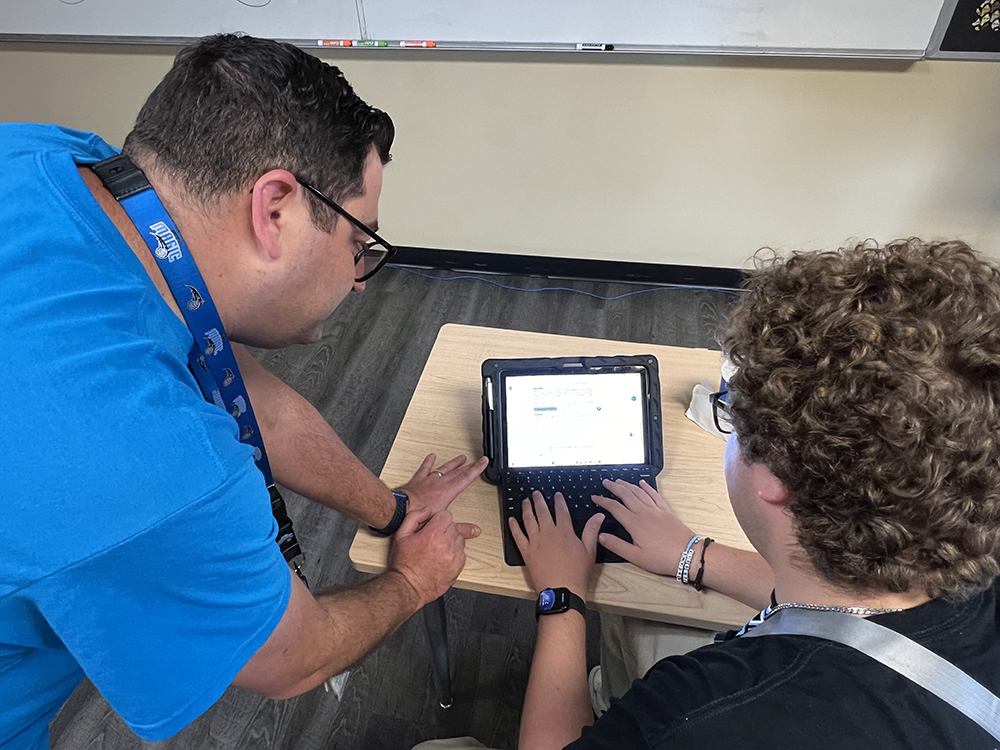By Paul Guzzo, University Communications and Marketing
As a former Hillsborough County teacher and school principal, Marlee Strawn takes pride in her openness to new technologies that enhance the classroom experience.
“Leveraging new technology is a passion of mine,” said Strawn, who graduated from USF in 2009 with a bachelor’s degree in social science education. “I am always looking for new ways to support students and support teachers from an efficiency perspective.”
Today, as the co-founder of Scholar Education, Strawn is introducing artificial intelligence in K-12 schools. Her Tampa-based company is doing so through its virtual classroom assistants that support teachers and students by helping develop interactive lesson plans tailored to meet each child’s specific needs.
Scholar Education is a collaborative effort with strong USF ties, including a software engineering company founded by USF graduates that developed the virtual assistant and a Tampa principal who is piloting the platform in her school.
In the fall, USF will launch the Bellini College of Artificial Intelligence, Cybersecurity and Computing, the first of its kind in Florida and one of the few like it in the country. However, as Strawn’s endeavor demonstrates, USF graduates are already leading the way in the field of artificial intelligence.
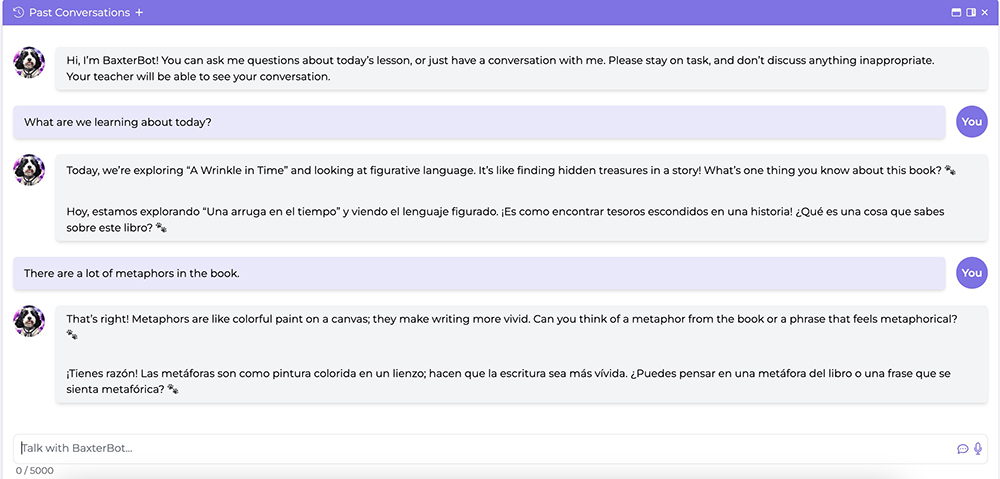
An example of how BaxterBot interacts with students, which includes translating the material [Photo courtesy of Scholar Education]
BaxterBot
Founded in early 2023, Scholar Education is dedicated to developing innovative tools for classrooms. Virtual assistants PAWfessor Bruce is geared toward teachers and BaxterBot is for students. Both appear on the screen as virtual dogs, designed and named after Scholar Education co-founder Ed Buckley’s Bernedoodle pups.
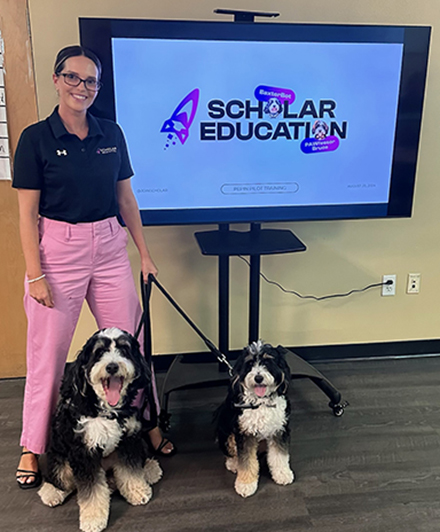
Marlee Strawn and the BaxterBot dogs [Photo courtesy of Scholar Education]
The virtual assistant operates as follows:
Each student has an account where teachers input key information, such as standardized test scores, native language and any special accommodations required for a learning disability.
While working on the interactive lesson plans, BaxterBot can do things such as provide students with further examples of math equations, explain new vocabulary words or offer deeper insights into science or history questions. And using their accounts’ personalized information, it can interact with students in ways that address the children’s specific educational needs, such as wording answers in ways that meet their reading levels or giving them the required additional time to complete an assignment.
BaxterBot can even translate a lesson plan into 179 different languages, alleviating that disconnect between teachers and students.
“If a teacher has 25 kids who learn in 25 different ways or have 25 different questions about the same lesson, this approach allows each child to receive the specific assistance they require,” said Strawn, the founding principal of Dr. Kiran C. Patel High School in Tampa. “This ensures that each child receives the best possible education.”
All interactions are also recorded and sent to the teacher in the form of complete transcripts and concise summaries.
“BaxterBot provides insights into the types of questions that students are asking and their learning processes,” Strawn said. “It’s giving teachers an idea of where kids are struggling and what types of clarification they need. This helps the teachers find ways to best support a student. AI can really transform the classroom experience.”
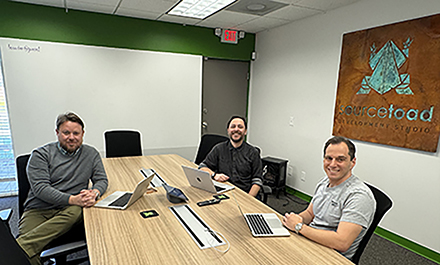
Sourcetoad founders Gregory Ross-Munro, Nick DeMelas and Justin Weber [Photo courtesy of Sourcetoad]
The developer
When looking for someone to develop BaxterBot, Strawn turned to Sourcetoad, which also has USF connections.
In 2008, after graduating from USF with master’s degrees in business administration in information systems and in entrepreneurship in applied technologies, Gregory Ross-Munro founded Sourcetoad, a play on the term “source code.”
In search of business partners, Ross-Munro recruited friends and fellow USF graduates Nick DeMelas, who earned his bachelor’s degree in information systems and management in 2004, and Justin Weber, who earned an MBA in entrepreneurship and management in 2008.
Early on, they built mobile and web applications for all types of businesses and eventually focused on complex applications in highly regulated spaces such as education, health care and finance. They’ve now grown the company to more than 60 employees.
Scholar Education and Sourcetoad initially explored different technology solutions, but as artificial intelligence advancements began transforming industries, their focus shifted. Inspired by the potential of artificial intelligence, they collaborated to develop an innovative platform that enhances classroom learning and teacher support.
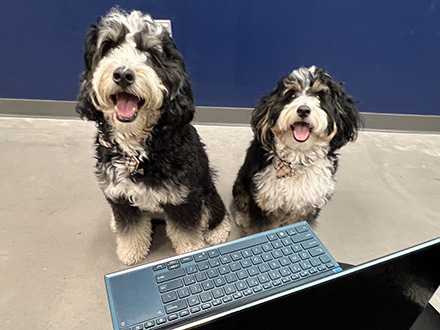
The BaxterBot pups [Photo courtesy of Scholar Education]
“It’s this exciting new world,” chief experience officer DeMelas said of large language models. “And its importance is only going to grow.”
Today, Sourcetoad focuses on building systems with large language models and machine learning integrated into platforms. These include one that interprets the mood of customer service emails and summarizes how a product is received, and another that details what restaurant menu options meet a patron’s specific dietary needs.
“Large language models are part of everything now,” said Webber, chief technology officer.
“Everyone at our company and who uses the AI systems we build, is probably at least 33% more productive,” said chief executive officer Ross-Munro. “That likely includes those using BaxterBot.”
The school
When seeking to initiate a pilot program for BaxterBot, Scholar Education aimed to demonstrate how it can simplify even the most complex classrooms.
So, this year, Scholar Education partnered with Pepin Academies for children with learning disabilities. With campuses in Tampa, Riverview and New Port Richey, totaling 1,200 students in grades three–12, Pepin Academies provides every student with an individualized education plan tailored to their specific needs.
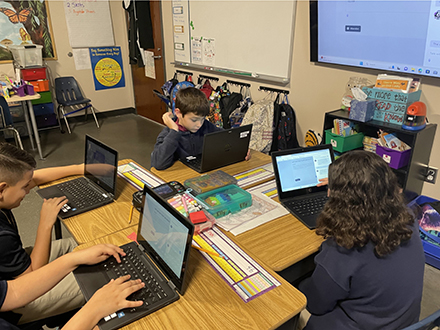
A Pepin Academies students use BaxterBot [Photo couresty of Scholar Education]
“The amount of paperwork and planning can be overwhelming for teachers,” said Tampa Principal Jennifer Messerschmitt, who earned her bachelor’s degree in exceptional student education from USF in 2007 and then a master’s degree in educational leadership and policy studies in 2012. “Being able to use BaxterBot for help in creating a lesson plan that comes to life for each student within seconds has been a major asset. And it’s helped students to become more independent because they can get added help without always having to ask a teacher for it.”
BaxterBot is being used in 10 classrooms across Pepin Academies, three of which are located on the Tampa campus. Due to its popularity, the Tampa principal expects those numbers to double next school year.
Messerschmitt said students have doubly benefited from using BaxterBot. It has assisted their regular education while also teaching them how to best utilize artificial intelligence.
“It’s no different than teaching them how to use the internet or a calculator,” Messerschmitt said. “It is something that will continue to be available to them. It’s a tool they will be using for years to come, in school and in jobs. So, let’s teach them how to utilize the tool effectively. AI is not part of the future anymore. It’s part of today.”
